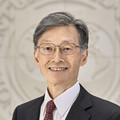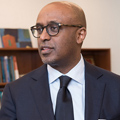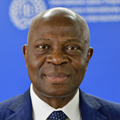IMF Seminar: Social Contract in Times of Crises

IMF SEMINAR EVENT
DATE: October 11, 2022
DAY: Tuesday
3:30 PM - 4:30 PM
LOCATION: IMF HQ1 Atrium (HQ1-1-700)
Overview
Recent global economic challenges have exposed gaps in systems that allow households cope with shocks, which could widen inequalities, and in some regions, have stalled economic transformation and raised social tensions, jeopardized decades of hard-won progress in reducing poverty and gender disparities, and make reaching the SDGs challenging. In this seminar, panelists will describe measures to strengthen economic and social systems to boost resilience in the face of shocks. Key issues under discussion revolve around: What is the impact of recent and current crises on labor markets? What weaknesses have these crises revealed in terms of social protection, in particular social safety nets? What policy responses are needed to strengthen resilience of national systems to future shocks and minimize their adverse short-term and long-term impact for the next generation?
Opening Remarks by Deputy Managing Director Kenji Okamura
Join the conversation via #SocialContract
IMF Seminar: Social Contract in Times of Crises
Panelists
Moderator: Stephanie Flanders
 Stephanie Flanders is Senior Executive Editor for Economics and Government at Bloomberg News and head of Bloomberg Economics. She was previously Chief Market Strategist for Europe at J P Morgan Asset Management in London (2013-17) and both BBC Economics Editor and BBC Newsnight’s Economics Editor 2002-13). She was Senior Advisor and speech writer to US Treasury Secretary Summers (1997-2001). She has also been a reporter at the New York Times and the Principal Editor of the 2002 Human Development Report. She chaired an Inclusive Growth Commission for the Royal Society of Arts, published March 2017.
Stephanie Flanders is Senior Executive Editor for Economics and Government at Bloomberg News and head of Bloomberg Economics. She was previously Chief Market Strategist for Europe at J P Morgan Asset Management in London (2013-17) and both BBC Economics Editor and BBC Newsnight’s Economics Editor 2002-13). She was Senior Advisor and speech writer to US Treasury Secretary Summers (1997-2001). She has also been a reporter at the New York Times and the Principal Editor of the 2002 Human Development Report. She chaired an Inclusive Growth Commission for the Royal Society of Arts, published March 2017.
Opening Remarks: Kenji Okamura

Mr. Kenji Okamura assumed office as Deputy Managing Director of the International Monetary Fund on December 3, 2021. Before joining the IMF, Mr. Okamura served as Special Advisor to the Prime Minister of Japan on International Economic Policies. Prior to that position, he was Vice Minister of Finance for International Affairs from 2020-21, Japan’s highest civil servant position in international finance. In this position, he oversaw all international finance work of the Ministry and participated in IMFC, G7, G20, ASEAN + 3, and other meetings, representing Japan as the Finance Minister’s Deputy.
Panelist: Abebe Selassie
 Abebe Aemro Selassie is the Director of
the IMF’s African Department, with responsibility for the Fund’s operations and
engagement with the 45 member countries from sub-Saharan Africa. He assumed
this role in September 2016. Prior
to this assignment, he oversaw the IMF’s work on Portugal under its
IMF/EU/ECB-supported adjustment program. Previously, he was the mission chief
for South Africa. Earlier in his career, he worked on the Fund’s lending
programs with Turkey, Thailand, Romania, and Estonia. Before
joining the IMF, he worked for the Government of Ethiopia and the
Economist Intelligence Unit in London.
Abebe Aemro Selassie is the Director of
the IMF’s African Department, with responsibility for the Fund’s operations and
engagement with the 45 member countries from sub-Saharan Africa. He assumed
this role in September 2016. Prior
to this assignment, he oversaw the IMF’s work on Portugal under its
IMF/EU/ECB-supported adjustment program. Previously, he was the mission chief
for South Africa. Earlier in his career, he worked on the Fund’s lending
programs with Turkey, Thailand, Romania, and Estonia. Before
joining the IMF, he worked for the Government of Ethiopia and the
Economist Intelligence Unit in London.
Panelist: Sarah Cumbers

Sarah is an advocate of evidence-based policy and practice. Her team works to use data and evidence to help better understand the complex factors that affect safety. This includes driving improvements in the availability, quality and accessibility of data, synthesis of evidence, and implementation of evidence into practice to improve safety outcomes. Sarah’s team oversees the World Risk Poll, a unique global survey on public perceptions and experience of risk and safety, and also leads the What Works programme.
Panelist: Gilbert Houngbo

Gilbert started his term as director general of the International Labour Organization on 1 October 2022. He was president of the International Fund for Agricultural Development from 2017 to 2022. He previously served as deputy director-general of the ILO where he led field operations in more than 100 countries. From 2008 to 2012, he was prime minister of the Republic of Togo. He has also held numerous leadership positions at the United Nations Development Programme.
Panelist: Situmbeko Musokotwane

Dr. Situmbeko Musokotwane serves as the Minister of Finance and National Planning for the Republic of Zambia, a position he has held since August, 2021.
In his current portfolio, he has been at the forefront of spearheading Zambia’s economic transformation agenda. In November, 2021, he successfully led discussions for Zambia to reach a Staff Level Agreement with the International Monetary Fund under the Fund’s Extended Credit Facility which was approved in August, 2022. This Facility has provided support to Zambia amounting to US$1.4 billion to support Zambia’s economic recovery efforts.
Dr. Musokotwane has also served as Minister of Finance and Economic Advisor to Zambia’s third Republican President among other key positions.
He holds a Bachelor of Arts Degree in Economics from the University of Zambia, a Master of Arts in Monetary Economics from the University of Dar-Es-Salaam and a Doctorate in Monetary Economics from the University of Konstanz, Germany.
Panelist: Justin Wolfers

Professor of Economics and of Public Policy at the University of Michigan and a Visiting Professor of Economics at the University of Sydney. Dr. Wolfers earned his Ph.D. in economics in 2001 from Harvard University. He earned his undergraduate degree in Economics in his native Australia at the University of Sydney in 1994. He was named by the IMF as one of the "25 economists under 45 shaping the way we think about the global economy." Wolfers' research focuses on labour economics, macroeconomics, political economy, law and economics, social policy and behavioural economics. He is a contributing columnist for the New York Times, appears frequently on TV, radio and in print.







